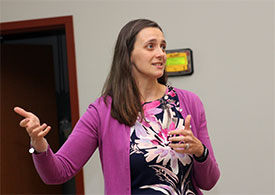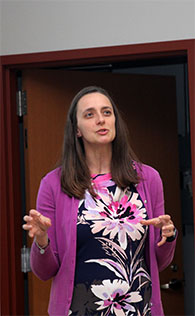Organic Chemistry students were about to enter an important part of the learning process when the Coronavirus forced a transition to virtual education.
They were beginning to plan their own projects, supported by literature through research, and carried out independently via experiment. It’s an empowering time in the lab; really the culmination of work for the entire year.
For Laura Wysocki, Associate Professor of Chemistry and the Organic Chemistry instructor, the news that Wabash would be in virtual classrooms and labs for the remainder of the semester hit hard.
 “What I most felt was sadness because I won’t be able to see my students and interact in that one-on-one fashion that I absolutely love about Wabash,” she started. “That extends to the lab because that’s where students have the ‘a-ha moments’ or make the connections to what we are learning in class by getting the hands-on experience.”
“What I most felt was sadness because I won’t be able to see my students and interact in that one-on-one fashion that I absolutely love about Wabash,” she started. “That extends to the lab because that’s where students have the ‘a-ha moments’ or make the connections to what we are learning in class by getting the hands-on experience.”
Wysocki admits that the transition to virtual learning, especially the labs, is not an easy one.
“But,” she laughed, “it is something I’m trying to work with.”
Now faced with the proposition of pulling off the move in quick succession, Wysocki opted to keep things as familiar as possible for the students. That means leaning on structure.
“We fall into a rhythm of daily homework and readings, and lecture and discussion, and while that won’t be the same, keeping as much of the structure the same as I can allows students to feel like this is going to continue to be a good education.”
Part of that is one-on-one conferencing so students can hear her voice, have conversations about science, and know that she, like so many other Wabash professors, cares deeply about each student’s education.
Another part is admitting that they cannot have the same experience as they would in the lab. That, too, saddens Wysocki, but it allowed her to focus on the key elements of the experience.
“What are things that I can do to help them prepare for future experiences and coursework that relates to the concepts of experimental design, thinking about planning their time, helping them to interact with the literature in different ways, and giving them the opportunity to do some scientific writing?” said the chemistry department chair. “Deciding which things are the critical pieces I want them to walk away with is how I’m designing the labs.”
She opted to start small in her planning, keeping the syllabus relatively uncomplicated while everyone familiarized themselves with the technology. Wysocki also noted that she was going to need a new level of creativity.
“I’m hoping to challenge myself to try a few new teaching techniques in the coming weeks so that I can give students a little bit more variety,” she said. “It’s definitely exercising a creative part of my teacher brain.”
Wysocki and her colleagues are focused squarely on the students, while figuring out how to handle such things like testing and assessment.
“The most important thing to us is getting our guys the education they need,” she said. “All of  my exams are short-answer, drawn, or written. How do I do that? Part of it is really taking the time to investigate in the chemical education community, part of it is making sure the students know what might come and what things might change, and part of it is just being able to think creatively about the people in my class and what’s going to best serve them. This is not the end of their chemistry experience.”
my exams are short-answer, drawn, or written. How do I do that? Part of it is really taking the time to investigate in the chemical education community, part of it is making sure the students know what might come and what things might change, and part of it is just being able to think creatively about the people in my class and what’s going to best serve them. This is not the end of their chemistry experience.”
Wysocki also hopes that there are some interesting discoveries in this new virtual reality. Some have already come to light. Several students have reached out to Wysocki thanking her for an initial experience close to in-person teaching. Wysocki was expecting some frustration. The gratitude caught her off guard.
“My students really showed me that they appreciate everything we are doing,” Wysocki said. “They want to continue their education. They are asking questions about how and what the next thing is going to look like. Instead of drawing back, they are curious about what’s to come. That’s been really heartwarming.”